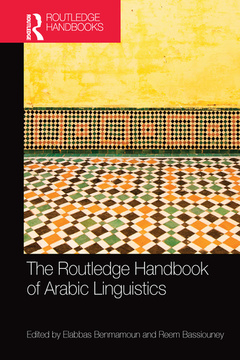Description
The Routledge Handbook of Arabic Linguistics
Routledge Language Handbooks Series
Language: English
Subjects for The Routledge Handbook of Arabic Linguistics:
Keywords
Young Man; Juba Arabic; Language Ideology; Central Asian Arabic; Arabic; Arabic Language; world; Arabic Sociolinguistics; Reem Bassiouney; Arabic Diglossic; Eiman Mustafawi; Arabic Grammatical Tradition; Ellen Broselow; Arabic Morphology; Ryan K; Shosted; Heritage Speakers; Maojing Fu; Tunisian Arabic; Zainab Hermes; Resumptive Pronoun; Adamantios Gafos; Territorial Nationalism; Hamid Ouali; Standard Language Ideology; Ahmad Alqassas; Emphatic Consonants; Lina Choueiri; Andalusian Arabic; Youssef A; Haddad; Consonantal Roots; Peter Hallman; Specific Language Impairment; Ahmed Moutaouakil; Morphological Decomposition; Abdulkafi Albirini; Broken Plurals; Karen Froud; Standard Arabic; Reem Khamis-Dakwar; Noun Phrase; Ali Idrissi; Np; Mark Hasegawa-Johnson; Heritage Arabic Speakers; Mohamed Elmahdy; Ahmad Al-Jallad; Gunvor Mejdell; geles Vicente; Irene Theodoropoulou; Dominique Caubet; Stefano Manfredi; Fida Bizri; Becky Schulthies; Faruk Akkuş; Keith Walters; Christophe Pereira; Mariam Aboelezz; Emad Abdul Latif; Adil Moustaoui; Muhammad Amara; Atta Gebril
Publication date: 06-2020
· 17.4x24.6 cm · Paperback
Publication date: 01-2018
· 17.4x24.6 cm · Hardback
Description
/li>Contents
/li>Biography
/li>
TheRoutledge Handbook of Arabic Linguistics introduces readers to the major facets of research on Arabic and of the linguistic situation in the Arabic-speaking world.
The edited collection includes chapters from prominent experts on various fields of Arabic linguistics. The contributors provide overviews of the state of the art in their field and specifically focus on ideas and issues. Not simply an overview of the field, this handbook explores subjects in great depth and from multiple perspectives.
In addition to the traditional areas of Arabic linguistics, the handbook covers computational approaches to Arabic, Arabic in the diaspora, neurolinguistic approaches to Arabic, and Arabic as a global language.
The Routledge Handbook of Arabic Linguistics is a much-needed resource for researchers on Arabic and comparative linguistics, syntax, morphology, computational linguistics, psycholinguistics, sociolinguistics, and applied linguistics, and also for undergraduate and graduate students studying Arabic or linguistics.
Contents
Introduction
Bassiouney and Benmamoun
Part I Phonetics, Phonology, and Morphology
1. Arabic Phonology, Eiman Mustafawi
2. Syllable Structure in the Dialects of Arabic, Ellen Broselow
3. Pharyngeal and Emphatic Consonants, Ryan K. Shosted, Maojing Fu, and Zainab Hermes
4. Stems in Arabic Morphology and Phonology, Adamantios Gafos
Part II Syntax, Semantics, and Pragmatics
5. The Syntax of Tense in Arabic, Hamid Ouali
6. Negative Sensitive Items, Ahmad Al-Qassas
7. Resumption, Lina Choueiri
8. Personal Datives in Lebanese Arabic, Youssef Haddad
9. Arabic Semantics, Peter Hallman
10. Arabic Functional Linguistics, Ahmed Moutaouakil
Part III Experimental and Computational Approaches
11. First Language Acquisition of Arabic, Abdulkafi Albirini
12. Neurophysiological investigations in studies of Arabic linguistics: The case of Arabic diglossia, Reem Khamis-Dakwar and Karen Froud
13. Arabic Heritage Speakers in the US, Abdulkafi Albirini
14. Experimental Data and Arabic Morphology, Ali Idrissi
15. Arabic Speech and Language Technology, Mark Hasegawa-Johnson, Mohamed Elmahdy, and Eiman Mustafawi
Part IV History, Contact, and Variation
16. Arabic and the other Semitic Languages, Ahmad Al-Jallad
17. Diglossia, Gunver Mejdell
18. An Alternative Approach: Understanding Diglossia/Code-switching Through Indexicality: The Case of Egypt, Reem Bassiouney
19. Patterns of Variation and Change in the Arab World, Angeles Vicente
20. Social Status, Language and Society in the Arab World, Irene Theodoropoulou
21. New Elaborate Written Forms in Darija: Blogging, Posting and Slamming in 2015 Morocco, Dominique Caubet
22. Arabic as a Contact Language, Stefano Manfredi
23. Contemporary Arabic-based Pidgins in the Middle East, Fida Bizri
24. Linguistic Anthropology Approaches to Arabic, Becky Schulthies
25. Peripheral Arabic, Faruk Akkuş
Part V Ideology, Policy, and Education
26. Arab Nationalism and/as Language Ideology, Keith Walters
27. Waves of Arabization and the Vernaculars of North Africa, Christophe Pereira
28. The Arabic Language and Political Ideology, Mariam Abolezz
29. Arabic Political Discourse, Emad Abdul Latif
30. Language Policy and Planning: The case of Morocco: A Critical Approach, Adil Moustaoui
31. Challenges of Arabic Language Education Policies in the Arab World, Muhammad Amara
32. Arabic Language Teachers’ Conceptions of Assessment and the Hidden Tension between Accountability and Improvement: Examples from Egyptian Schools, Atta Gebril
Index
Elabbas Benmamoun is Professor of Asian and Middle Eastern Studies and Linguistics at Duke University, USA.
Reem Bassiouney is Professor in the Applied Linguistics Department at the American University in Cairo, Egypt.




